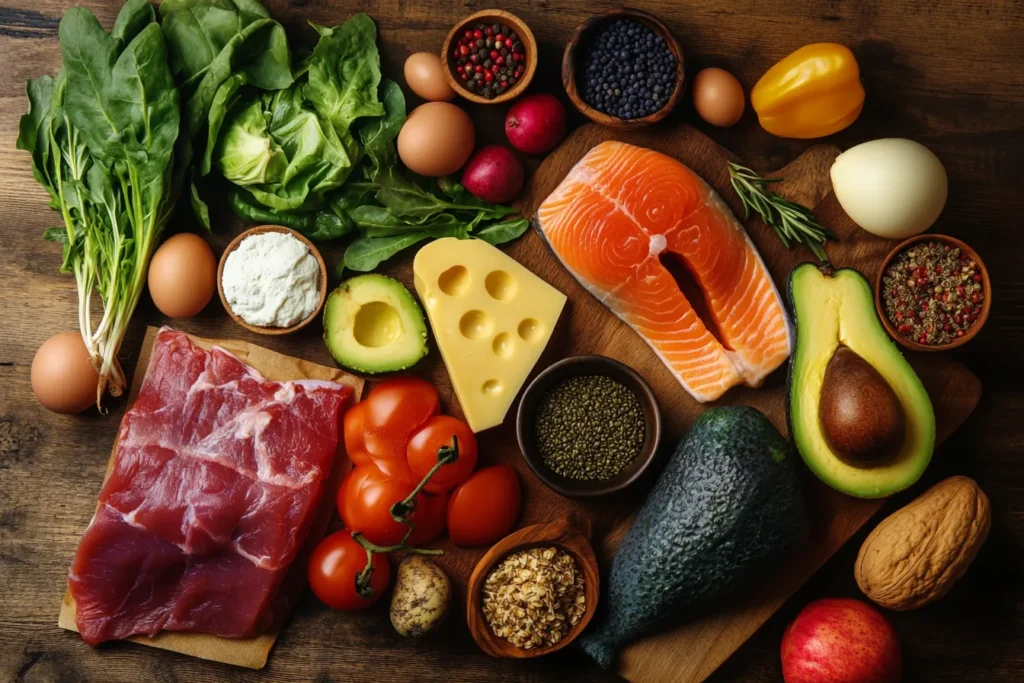Table of Contents
What are the 9 rules of keto? The ketogenic diet, or keto, has exploded in popularity, promising rapid weight loss and improved health. Navigating this low-carb, high-fat lifestyle can feel overwhelming. Understanding and adhering to key principles are essential for success and avoiding common pitfalls. This guide illuminates the 9 essential rules of keto, providing the knowledge you need to transform your health journey.
What Are The 9 Rules of Keto: A Deep Dive
The keto diet fundamentally shifts your body’s primary fuel source from carbohydrates to fats. This metabolic state, known as ketosis, occurs when your body starts breaking down fats into ketones, which are then used for energy. Achieving and maintaining ketosis requires diligent adherence to specific dietary guidelines. These rules, while sometimes perceived as restrictive, are the foundation for experiencing the purported benefits of keto (What are the 9 rules of keto?).
Rule #1: Severely Restrict Carbohydrate Intake
The cornerstone of keto is drastically reducing carbohydrate consumption. Aim for a daily intake of 20-50 grams of net carbs (total carbs minus fiber). This restriction forces your body to deplete its glycogen stores and begin producing ketones. This step is crucial for entering ketosis. Consider carefully tracking your carbohydrate intake using a food tracking app.
Rule #2: Embrace Healthy Fats
Fats become your primary fuel source on keto, so choosing healthy fats is paramount. Prioritize sources like avocados, olive oil, coconut oil, nuts, seeds, and fatty fish. These fats provide essential nutrients and support overall health. Avoid processed vegetable oils, which can be inflammatory. Eating the right kinds of fats is essential (What are the 9 rules of keto?).
Rule #3: Moderate Protein Consumption
While keto is high-fat, it’s not necessarily high-protein. Excessive protein intake can be converted into glucose through a process called gluconeogenesis, potentially hindering ketosis. Aim for a moderate protein intake, typically around 0.8 grams per pound of lean body mass. Protein is important, but control is key (What are the 9 rules of keto?).

Rule #4: Stay Hydrated
Hydration is crucial for overall health and becomes even more important on keto. Ketosis can have a diuretic effect, leading to increased fluid loss. Drink plenty of water throughout the day to prevent dehydration and support kidney function. Consider adding electrolytes to your water, especially in the initial stages of keto (What are the 9 rules of keto?).
Rule #5: Replenish Electrolytes
As mentioned, keto can lead to electrolyte imbalances. Low levels of sodium, potassium, and magnesium are common. Supplementing with electrolytes or consuming foods rich in these minerals can help prevent symptoms like fatigue, headaches, and muscle cramps. Bone broth, avocados, and leafy greens are excellent sources (What are the 9 rules of keto?).
Rule #6: Plan Your Meals
Success on keto relies heavily on planning. Prepare meals in advance to avoid impulsive decisions that could derail your progress. Having keto-friendly snacks on hand can also prevent unhealthy cravings. Careful planning can set you up for success (What are the 9 rules of keto?).
Rule #7: Track Your Progress
Monitoring your progress can help you stay motivated and make necessary adjustments to your diet. Track your weight, ketone levels, and any noticeable changes in your health. Ketone testing strips or a blood ketone meter can provide valuable insights into your ketosis levels. Progress tracking helps to achieve better results (What are the 9 rules of keto?).
Rule #8: Be Patient and Consistent
Transitioning to keto can take time, and you may experience initial side effects like the “keto flu.” Patience and consistency are key to overcoming these challenges and reaping the long-term benefits of keto. Stick with the plan, even when it gets tough, and celebrate small victories along the way (What are the 9 rules of keto?).
Rule #9: Listen to Your Body
Everyone responds differently to keto. Pay attention to how your body feels and adjust your diet accordingly. If you experience persistent negative side effects, consult with a healthcare professional. The keto diet is not a one-size-fits-all approach, and individualization is crucial.
The Science Behind the 9 Rules of Keto
Understanding the scientific principles behind these rules can enhance your commitment to the ketogenic diet. Ketosis is a natural metabolic state that humans have evolved to enter during periods of food scarcity. By mimicking this state through dietary modification, you can tap into your body’s fat-burning potential (What are the 9 rules of keto?).
Ketogenesis and Fat Adaptation
When carbohydrate intake is severely restricted, your liver begins producing ketones from fatty acids. These ketones, including beta-hydroxybutyrate (BHB), acetoacetate, and acetone, become the primary fuel source for your brain and other tissues. This process, known as ketogenesis, allows your body to continue functioning efficiently despite the lack of glucose.
Over time, your body adapts to using ketones for fuel, a process called fat adaptation. This adaptation can lead to increased energy levels, improved mental clarity, and enhanced physical performance. Fat adaptation isn’t instant (What are the 9 rules of keto?).
Hormonal Effects of Keto
The ketogenic diet can have a profound impact on hormone levels. Insulin, a hormone responsible for regulating blood sugar, decreases significantly on keto. This reduction in insulin can improve insulin sensitivity and promote weight loss. Additionally, keto may influence the levels of other hormones, such as ghrelin (the hunger hormone) and leptin (the satiety hormone).
Potential Health Benefits
The ketogenic diet has been studied for its potential benefits in various health conditions, including epilepsy, type 2 diabetes, and neurological disorders. While more research is needed, preliminary studies suggest that keto may improve blood sugar control, reduce seizures, and enhance cognitive function. Discuss it with a professional first (What are the 9 rules of keto?).
Implementing the 9 Rules of Keto: Practical Tips
Putting these rules into practice requires a proactive and informed approach. Here are some practical tips to help you successfully navigate the ketogenic diet.
Meal Planning and Grocery Shopping
Start by creating a meal plan for the week, focusing on keto-friendly foods. Make a grocery list based on your meal plan to avoid impulse purchases. Stock up on healthy fats, low-carb vegetables, and moderate-protein sources (What are the 9 rules of keto?).
Tracking Macronutrients
Use a food tracking app to monitor your macronutrient intake (carbohydrates, fats, and protein). This helps you stay within your target ranges and ensure you’re consuming enough of the right nutrients. Consistency in tracking is crucial for success (What are the 9 rules of keto?).
Keto-Friendly Recipes
Explore online resources and cookbooks for delicious and satisfying keto-friendly recipes. Experiment with different flavors and ingredients to keep your meals interesting and prevent boredom. A variety of choices helps (What are the 9 rules of keto?).
Common Mistakes to Avoid
Avoid common mistakes like consuming hidden carbohydrates, overeating protein, and neglecting electrolytes. Read food labels carefully and be mindful of portion sizes. Addressing electrolyte imbalances will improve your experience.

Overcoming Challenges on Keto
The ketogenic diet can present challenges, particularly in the initial stages. Here are some strategies for overcoming common obstacles (What are the 9 rules of keto?).
The “Keto Flu”
The “keto flu” is a common side effect of transitioning to keto, characterized by fatigue, headaches, and flu-like symptoms. It’s typically caused by electrolyte imbalances and dehydration. Increase your intake of water and electrolytes to alleviate these symptoms.
Cravings and Temptations
Cravings for carbohydrates can be intense, especially in the beginning. Prepare keto-friendly snacks to satisfy your cravings and avoid giving in to temptations. Distract yourself with other activities when cravings strike (What are the 9 rules of keto?).
Social Situations
Navigating social situations while on keto can be tricky. Plan ahead by bringing your own keto-friendly snacks or meals to gatherings. Communicate your dietary needs to friends and family to avoid awkward situations.
Long-Term Sustainability
The long-term sustainability of keto depends on individual preferences and health goals. Some people find it easy to maintain keto long-term, while others prefer to cycle in and out of ketosis. Listen to your body and adjust your diet as needed.
Is Keto Right For You? Considerations and Precautions
While the ketogenic diet can offer potential benefits, it’s not suitable for everyone. Before starting keto, consider the following factors.
Medical Conditions
People with certain medical conditions, such as kidney disease, liver disease, or pancreatitis, should avoid keto. Pregnant or breastfeeding women should also exercise caution and consult with a healthcare professional. Speak to a professional first before starting keto.
Individual Needs
Your individual needs and preferences should guide your dietary choices. If you have a history of disordered eating, keto may not be the best option. Listen to your body and prioritize your mental and physical health.
Consulting a Healthcare Professional
It’s always a good idea to consult with a healthcare professional or registered dietitian before starting any new diet, including keto. They can help you determine if keto is right for you and provide personalized guidance. Professional advice is the best option to determine if keto is right for you.

What Are The 9 Rules of Keto? It’s About a Lifestyle
What are the 9 rules of keto? They aren’t just about food restrictions. It’s about adopting a new lifestyle. By understanding the principles and implementing the practical tips outlined in this guide, you can embark on a successful and sustainable keto journey. Remember to prioritize your health, listen to your body, and seek professional guidance when needed.
FAQ
Keto Cottage Cheese Pancakes
Keto cottage cheese pancakes are a popular low-carb breakfast option. They usually involve blending cottage cheese with eggs, a keto-friendly flour alternative (like almond or coconut flour), and sweetener. They are a good alternative to traditional pancakes because they are packed with protein.
Is cottage cheese good for keto?
Yes, cottage cheese can be a good option for keto, but it’s essential to check the carbohydrate content. Opt for full-fat cottage cheese, as it tends to be lower in carbs. Be mindful of portion sizes to stay within your carb limits. Some brands may add sugar.
Are protein pancakes really healthy?
The healthfulness of protein pancakes depends on the ingredients. If made with whole, unprocessed ingredients like oats, eggs, and protein powder, they can be a nutritious option. However, some protein pancake mixes may contain added sugars and artificial ingredients, making them less healthy.
Why do bodybuilders eat pancakes?
Bodybuilders often eat pancakes as a source of carbohydrates to fuel their workouts and replenish glycogen stores after training. Pancakes provide a quick source of energy and can be easily customized with protein powder or other supplements to support muscle growth and recovery.

